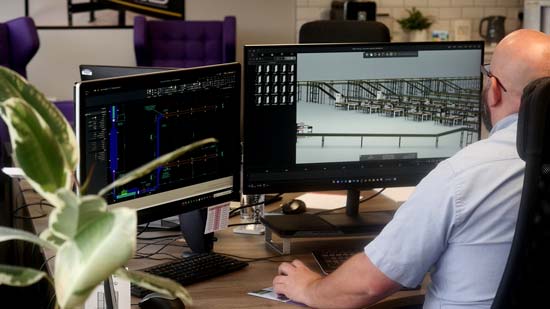Why partnering with a material handling specialist like Conveyor Systems Ltd can ensure success for e-commerce, distribution, and logistics companies.
In today’s fast-paced and ever-evolving e-commerce landscape, efficient warehouse and distribution centre operations are vital for the success of any company or distributor. As customer expectations continue to rise, businesses must plan for automation and materials handling systems when building new warehouses and distribution centres.
This not only increases productivity but also enhances the overall customer experience. To achieve optimal results, partnering with a materials handling specialist is crucial. This article will discuss the significance of careful planning in floor/slab specification, process flow, general layout, inbound and outbound product handling, and the role of a materials handling specialist.
Take a look at our case study of City Electrical Factors (CEF) automation project at their eCommerce distribution centre here.
Floor/Slab Specification
Before installing any mezzanine or heavy-duty equipment, it is crucial to assess the suitability of the warehouse floor or slab. A well-designed and reinforced base ensures the stability and safety of the mezzanine, equipment, and personnel and ensures that your warehouse is built with the appropriate floor specifications to handle the intended load and avoid costly structural issues in the future.
Process Flow
Designing an efficient process flow is essential for smooth warehouse operations. An effective process flow considers the optimal movement of goods from inbound to storage, order picking, and outbound shipping, reducing manual handling and maximising productivity. Conveyor Systems Ltd can help you develop a tailored process flow that incorporates automation and material handling systems to optimise throughput and minimise delays.
Inbound and Outbound Product Handling
Automating inbound and outbound product handling can significantly reduce labour costs, minimise human error, and increase throughput. By consulting with a materials handling specialist, you can identify the best automation and material handling solutions tailored to your unique needs, such as conveyor systems, automated storage and retrieval systems (AS/RS), and robotic palletisers. Implementing these solutions will enable you to optimise your warehouse operations and achieve higher levels of efficiency.
General Layout: Key Considerations for Conveyor Systems in Warehouse Design
The general layout of a warehouse or distribution centre directly impacts the efficiency of the entire operation. A well-designed layout optimises space utilisation, reduces travel distances, and streamlines material flow. By partnering with a systems integrator, you can ensure that your new facility is designed with optimal aisle widths, storage configurations, and automation systems that can accommodate future growth and changes in demand. In this section, we will delve deeper into the specific considerations for conveyor systems in warehouse design, including space efficiency, expansion possibilities, accessibility, and safety.
Space Efficiency
When integrating conveyor systems into your warehouse layout, it is essential to maximise space efficiency. This includes strategically positioning conveyors to minimise dead space and ensuring that they are appropriately sized for the products being transported. In addition, the design should consider the flexibility of the conveyor system to handle various product sizes and types and allow for seamless integration with other material handling equipment, such as sortation systems, palletisers, and packaging machines. Spiral Conveyors are an ideal solution for moving goods up and down levels whilst minimising floor space.
Expansion and Future Throughputs
As your business grows, your warehouse may need to handle increased throughput. It’s essential to design your conveyor system with scalability in mind, allowing for future expansions or reconfigurations. This can be achieved by selecting modular conveyor systems that can be easily extended, reconfigured, or upgraded to accommodate changes in demand, product types, or warehouse processes.
Accessibility for Warehouse Personnel and Mobile Machinery
The warehouse layout should also consider accessibility for personnel and mobile machinery, such as forklifts and autonomous mobile robots (AMRs). This includes designing conveyor systems with stepovers, bridges, or raised sections, allowing for the safe and efficient movement of people and machinery across the facility. Additionally, the conveyor system should be designed to minimise obstructions and bottlenecks, ensuring smooth flow and easy access to all areas of the warehouse.
Safety Considerations
Safety is paramount when designing a warehouse layout and integrating conveyor systems. Conveyor systems should be equipped with safety features like emergency stop buttons, guards, and warning signs to prevent accidents and injuries. Emergency exit access must be considered to ensure that personnel can safely and quickly evacuate the building in an emergency.
Fire safety is another critical consideration. Conveyor systems should be designed and positioned to minimise the risk of fire spreading throughout the warehouse. This includes ensuring that fire suppression systems, such as sprinklers and extinguishers, are easily accessible and not obstructed by the conveyor system. Additionally, the layout should provide clear access for firefighting personnel and equipment in an emergency.
The Role of a Materials Handling Specialist
By partnering with a materials handling specialist, you benefit from their extensive knowledge and experience in designing and implementing automation and material handling systems. They will work closely with you to understand your needs and develop tailored solutions to meet your operational goals. From the initial planning stages to the installation and ongoing support, Conveyor Systems Ltd will ensure that your investment in automation and materials handling systems yields maximum returns.
Conclusion
In conclusion, planning for automation and materials handling systems, including conveyor systems, is a crucial aspect of building a new warehouse or distribution centre for e-commerce, distribution, or logistics companies. By addressing essential factors such as space efficiency, expansion possibilities, accessibility for personnel and mobile machinery, and safety, you can create an efficient, flexible, and safe warehouse environment that can adapt to your business’s changing needs and demands. Consulting a materials handling specialist can optimise floor/slab specifications, process flow, general layout, and inbound and outbound product handling, resulting in a highly efficient and cost-effective operation. Don’t leave the success of your warehouse project to chance; partner with Conveyor Systems Ltd to ensure all these aspects are considered and implemented in your facility, guaranteeing its success from the ground up.
















